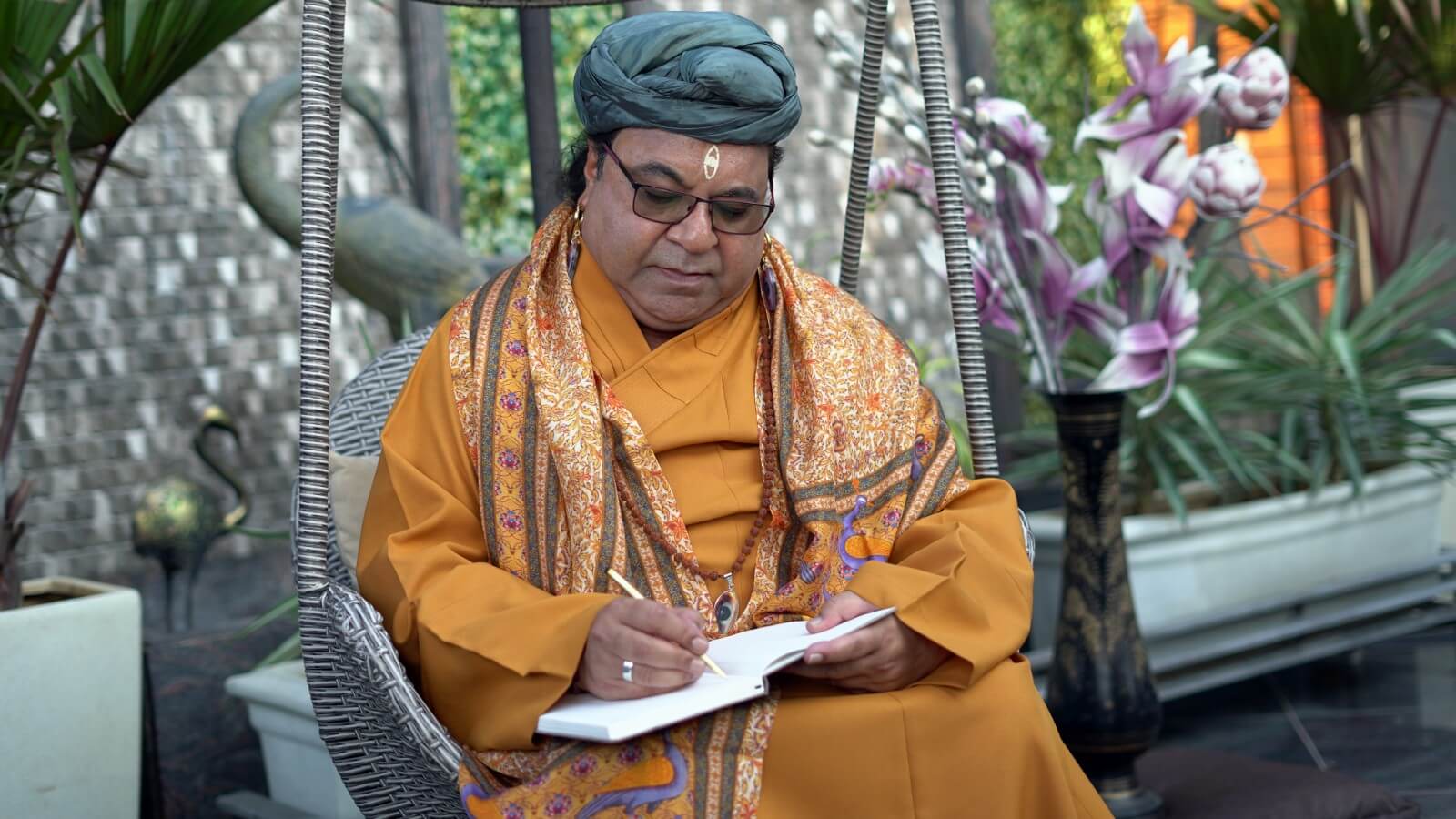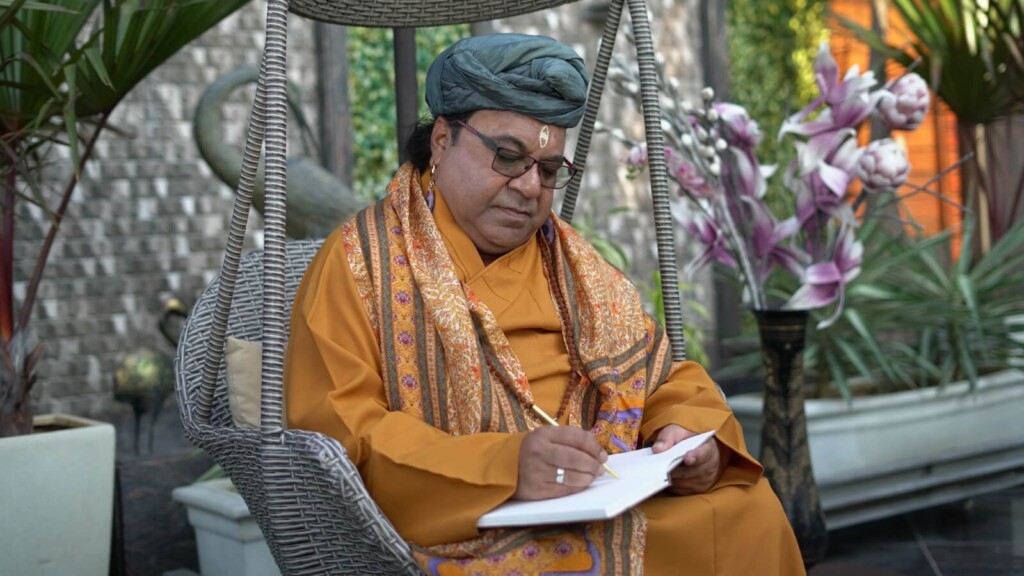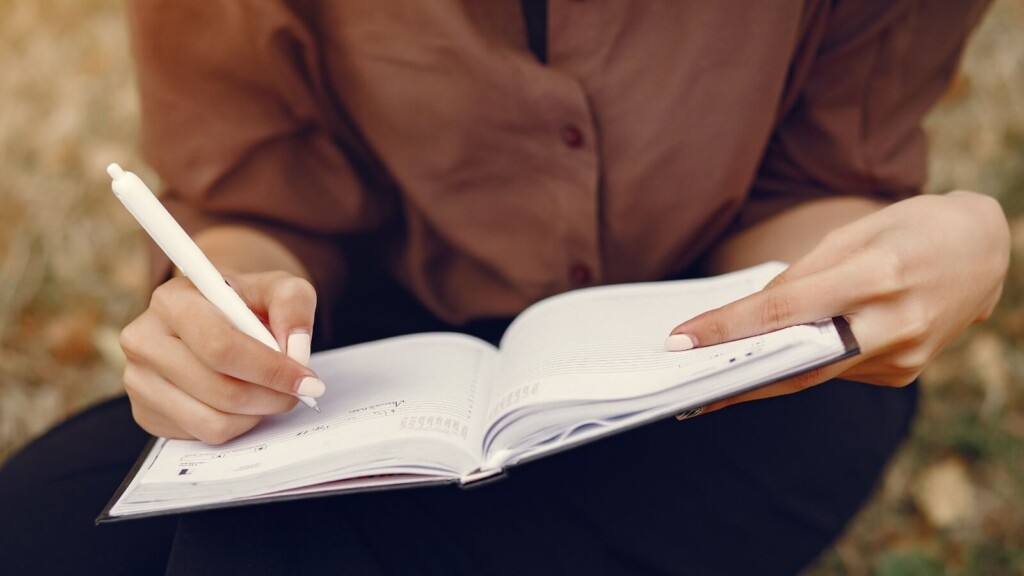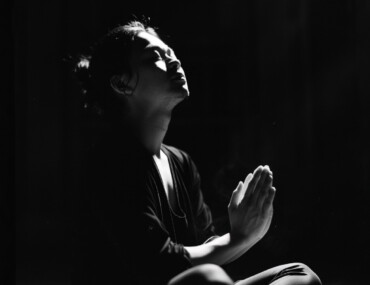Journaling ‘A Mindful Approach to Capture Life’
(Based on the live discourse of Param Dwij)
(परम द्विज के प्रवचन पर आधारित)

(Based on the discourse of Param Dwij)
Om-Tat-Sat; ‘Daata’ is in my remembrance!
Let us discuss a very important spiritual topic today, a significant chapter for your spiritual journey.
Journaling! It’s as simple as writing a daily diary. This uncomplicated practice can help you progress faster towards your spiritual and life goals.
Journaling is a great way to incorporate mindfulness practices into your daily meditation routine. In meditation, people observe their thoughts without judging, like a child observing flowing water in a river while sitting on its bank. Journaling is a method of capturing thoughts and reflecting on events throughout the day.
It is a wonderful experience to pick up a pen and write down memories and thoughts that revolve in one’s head without arbitration, judging, or any particular agenda. It has been observed that keeping or carrying a diary for journaling helps people be more composed and have better mental and physical health.
In today’s fast-paced and chaotic world, mindfulness has become an all-encompassing term that can be easily implemented anywhere and at any time; however, it requires time and consistency for practice.
Although mindfulness is widely available, it can be confusing for beginners to know where to begin and how frequently they should practice meditation for mindfulness, mindful eating, mindful exercises, or even walking. Journaling is a way of practising mindfulness that is so easily accessible without any detailed tutoring on the subject and in your journey of mindful living.
People can begin journaling by scribbling their mood every day when they drink their morning coffee, or they can set aside a specific time to sit down and reflect on the day a few past days or even an entire week. It may take a few minutes to scribble a ‘couple of sentences’ or up to half an hour to record what happened. It is an outlet to go deeper and place innermost thoughts on a page. No perfect form of writing can define the right or wrong way to journal — but it is necessary to begin journaling.
Journaling allows you to connect with yourself and observe your thoughts, emotions, and experiences as an audience in a contemplative and nonjudgmental way. It is a meditational practice that not only cultivates self-awareness and self-reflection but also fosters personal growth, leading to a more mindful life.

You can break down journaling practice into a couple of easy steps.
Establish a Daily Schedule:
As the purpose of journaling is to scan your whole day from morning to night, you can identify a specific time or part of the day when you are generally in a composed mood and mind – the best time of the day for you when you can easily get to some calm and meditative mode. Though this is also not necessary, as journaling can be done at any time of the day set, ting a schedule will help in maintaining consistency – no matter if it is in the morning, before going to bed at night, or at any other time of the day that suits you the most. Also, it is good to find an isolated place when making journal entries to ruminate and reflect upon your day without interruption.
Start with Basics:
Take it easy, and don’t make it complicated or complex. It is all and only about you and for you. Before putting your thoughts on paper, close your eyes, take a few long breaths, bring your attention to the present moment, and focus on creating a calm and centred mindset.
Find Your Own Technique of Journaling: Remember, there are no rules when it comes to journaling. You have the freedom to choose from several techniques to express your thoughts, behaviour, mood, temperament, and experiences. Find the one that resonates with you and your goals.
Although writing a journal does not have any rules, there are several techniques you can use to express your observed thoughts, behaviour, mood, temperament, and experiences better. You can choose from these techniques depending on your needs and goals.
Free Journaling:
If your mind always or generally remains over-occupied, the free journaling technique may be suitable for you. Free writing lets your thought process flow smoothly as a river without any disruption of judgment or censorship. A person needs to pen down whatever is in the mind – allow it to come out freely without even worrying about grammar, sentence structure or coherence. This will help you unearth insights and understanding and help release the mental clutter.
Gratefulness Journaling:
If you are surrounded by negativity, try the gratefulness journaling technique. The mind can be an enemy or a friend. What makes the difference is how to approach it. Rather than focusing on complaints or negativity, such as what you have or what you don’t, or creating a feeling of sadness for any reason, such as competition, jealousy, failure, ambitions, etc., you switch your focus to feeling gratitude about what you have, to help shift your mindset to a more positive and optimistic perspective. People can start reflecting on positive experiences, relationships, personal qualities, achievements and accomplishments. So, if this works for you, begin penning down what you should be grateful for.
Reflection and Self-inquiry:
If you feel demotivated, remain uncertain, lack decision-making, or are mostly unsure about things, try the ‘reflection and self-enquiry’ journaling technique. A journal is a room in your mind where you find your true self, observe, and explore yourself without judging society’s conditioning or perceived ideas about yourself from past experiences. This room is your personal space for a meditation practice of self-reflection. You can ask some poignant and thought-provoking questions related to your everyday life, exploring your emotions and thoughts deep down in your subconscious mind that you carry with you all day. This journaling technique of Reflection and Self-enquiry equips you with clarity of thought, a deep understanding of yourself and self-awareness. This helps you realise your potential and overcome negative emotions to achieve a balanced lifestyle that is fuller, proactive and self-motivated.
Stream of consciousness:
If you are the kind of person who feels too attached or attached to things and your certain personal relationships, such as with your son, wife, daughter, friend, mother, father, brother or sister, and due to this, you feel stressed to the extent that you worry about them unnecessarily, without reason, out of your affection and attachment with them. Stream-of-consciousness journaling may be the right technique for you. This attachment is nothing but infatuation. This kind of affection for things and relationships is an illusion, which is mainly due to your long-term goals and needs, but in the process, you spoil your present for no reason. The Stream of Consciousness journaling technique will help you access thoughts and emotions in your subconscious mind, revealing insights about and understanding their patterns. Stream of Consciousness journaling is writing spontaneously, allowing your overwhelming thoughts and feelings to overflow without interruption of judgment, logic and reason. This particularly captures the non-linear way the human mind works and will help you analyse the thought process that may not be logical and organised. This type of journaling may help you overcome binding attachments with things and people, help you to live in the present and be intentional about your actions. It may also increase your intuition capacity.
Mindfulness Journaling:
Everyone’s goal is to live in the present with awareness in the state of consciousness without feeling overwhelmed and overly reactive. Mindfulness Journaling demands freedom of thought with a mindful approach and a non-judgemental attitude, paying attention to your hovering thoughts and emotions as they arise. What you, as a writer of the journal, can do is to watch them without being attached to those thoughts while writing them. This technique allows you to listen to your inner voice without being connected and will help you realise your authentic self. It is all about being aware, including your present moment. Regularly practising this technique will make you more positive, focused, self-aware and in control. This may also help you deal with mental issues, including emotional imbalances. This technique will also help you in increasing your memory power.
‘Let It Go – Release Thoughts’ Journaling:
Writing a journal is a cathartic practice that lets you express yourself and release the stuck emotions and anxieties that have been triggering your traumatic emotions and have been disturbing you. After putting it on paper, it is in your hand to let it go, which fills you with a sense of release and relief. This type of journaling is a process of unloading your unwanted thoughts and emotions and making free space to fill with healthy and positive emotions.
Spiritual Journaling:
This therapeutic practice explores your inner self by digging under and writing down your feelings, emotions, thoughts, struggle questions, and questions about the meaning and purpose of life, including their reflections on you. Writing a spiritual journal is to connect with your inner self to become more self-aware of your true identity and purpose in life. Writing a spiritual journal is a powerful technique to gain inner strength, particularly during difficult times, as you better understand the self. This will help you save from being reactive and defensive. This will also help you achieve better social interactions and relationships.
This may also give rise to your ‘faith’ journey and help clear doubts and obstacles on that path. This technique enables you to mirror the mind and train it in the right direction to strengthen your spiritual intellect—your heart.
The regular journaling techniques I described earlier are generally at the surface level, but spiritual journaling is very deep inside. It explores hidden, unseen, and unknown fears and illusions. It also explores hopes and inspirations to lead you towards your true self and all hidden potential as you gain clarity of things and facts.
Spiritual journaling incorporates other techniques and helps one realise the higher purpose of life and self. It helps you increase self-love, intuition power, self-awareness, spiritual integration, and peace and stability. This journaling technique will make you more and more soul-conscious as you start living from the soul. In spiritual journaling, it is important that you keep your journal with you and get into the habit of writing as you experience things and as thoughts emerge in your mind.
Periodical Analysis:
However, to celebrate progress and recognise growth areas, it is essential to review the journal entries periodically to gain insights into recurring patterns of thoughts and emotions and areas of improvement where you need to focus more. Accordingly, you can change your journaling technique. With periodic reviews, you will be more watchful of your behavioural patterns as they develop and more observant of your experiences.
‘Living Dwij’ Philosophy:
In ‘Living Dwij’ philosophy, practice and disciplines, spiritual journaling is recommended daily for all. Not only that, but in the ‘Living Dwij’ tradition, we even recommend monitoring your spiritual progress on a daily basis to remain focused. We recommend this to all ‘Dwijs’ and those who may follow and believe in the ‘Living Dwij’ philosophy as a mandatory daily spiritual activity, where you are required to create a list of 10 vows to help you progress in your spiritual journey as a ‘Dwij’ and Give marks to yourself for each vow out of ten before going to sleep every day.

We recommend that you keep monitoring your daily progress in your spiritual journey to reach to the highest possible goal as a ‘Dwij’ to gain absolute liberation from life, ‘Jeevan-mukti‘, ‘Moksha’. You may email us if you need the ‘Vows Monitoring Template’ with 10 vows I have recommended for all ‘Dwijs’ and followers. You may also submit your monthly evaluation sheet, in confidence with the ‘Daata’, via email to ‘Living Dwij’ to help yourself remain committed to your progression. Daily Spiritual Journaling is an essential and powerful activity for self-growth, direction and focus.
There is no specific pattern of journaling in general. It is beyond any rules and regulations and form of writing. It is a personal practice of expressing your thoughts and conversing with them, tailoring them to your likings and requirements. The motive behind journaling is exploring your experiences and yourself, developing mindfulness, and deepening your insights and understanding of experiences and incidents as they happen.
Happy Journaling to everyone. I wish you well in your spiritual journey!
Om Tat Sat!
…Param Dwij



